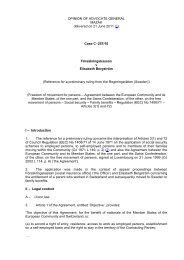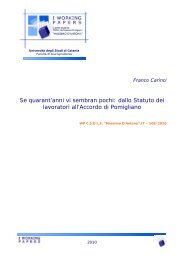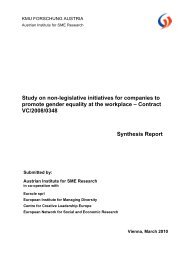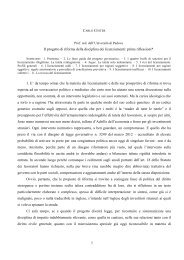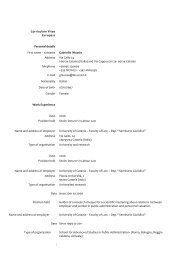Full text - European Trade Union Institute (ETUI)
Full text - European Trade Union Institute (ETUI)
Full text - European Trade Union Institute (ETUI)
Create successful ePaper yourself
Turn your PDF publications into a flip-book with our unique Google optimized e-Paper software.
Temporary agency work in the <strong>European</strong> <strong>Union</strong><br />
Conclusion<br />
The long-lasting and difficult debate that finally led to the adoption of the Directive<br />
on Temporary Agency Work shows how significant this issue is at <strong>European</strong><br />
level. Meanwhile, as the process has been very lengthy, the objectives<br />
of the <strong>European</strong> legislator have changed. At the beginning of the process, the<br />
aim pursued by the <strong>European</strong> Commission was to regulate temporary agency<br />
work and to ensure minimum protection for agency workers. Nowadays, temporary<br />
agency work is also seen as a tool for the creation of jobs and growth<br />
emblematic of flexicurity, in particular in the discourse of the <strong>European</strong> Commission<br />
and the employers’ associations. As a consequence, if ensuring workers<br />
protection is still one of the objectives, flexibilisation has also become an<br />
element to take into account (Lhernould 2012). Compared to all other forms<br />
of employment, temporary agency work has the worst record for working conditions,<br />
judged in particular on a number of indicators, including repetitive<br />
labour, and the supply of information to employees about workplace risks<br />
(ETUC 2007). Indeed, temporary agency workers tend to have less control<br />
over the sort of work they do and how they do it, to get less training, to have<br />
a higher rate of workplace accidents and are less well-informed about safety,<br />
and to do more shift work and have less time to complete jobs.<br />
With the Directive, as an essential piece of social legislation guaranteeing the<br />
protection of workers and in particular the implementation of a principle of<br />
equal treatment from the first day of their assignment, there are hopes that<br />
the situation will improve towards better working conditions for temporary<br />
agency workers. However, the review of prohibitions and restrictions as well<br />
as possibilities of derogation may lead to more partial and inconsistent implementation<br />
of the Directive in the Member States (Lhernould 2012).<br />
Finally, there are main causes for concern, ranging from the proper implementation<br />
of the equal treatment from day one, the review of restrictions and<br />
prohibitions that might lead to the diminution of workers’ rights and protection,<br />
to issues related to proper access to workers’ collective rights and training<br />
and proper protection in case of dismissal.<br />
Finally, some critical trends have been witnessed in various Member States.<br />
Indeed, the use of temporary agency work in the public sector is foreseen in<br />
some Member States to replace civil servants (France) or it is seen as worsening<br />
the existing protection (Greece). Transposition measures are sometimes<br />
unsatisfactory (Bulgaria, Germany), or Member States adopt a minimal inter-<br />
WP 2012.13 63





